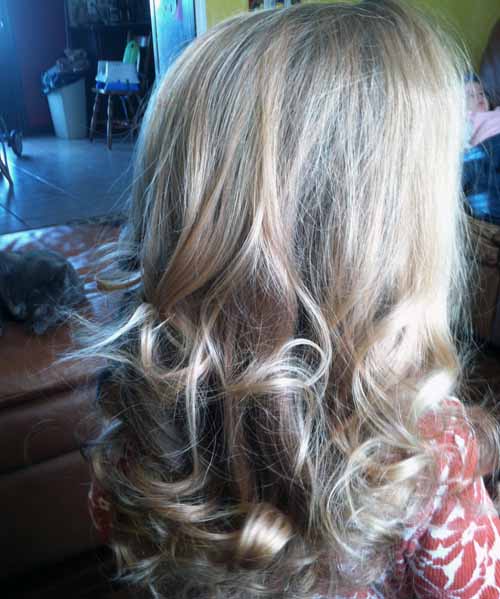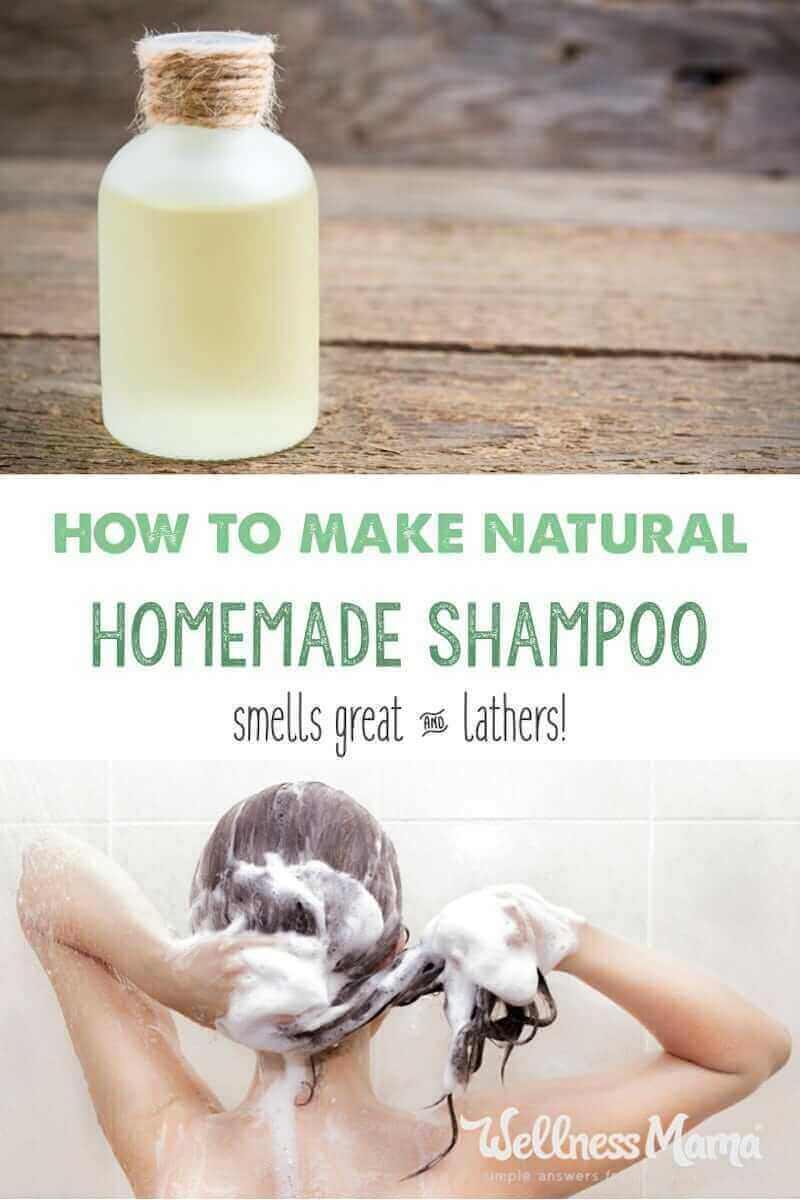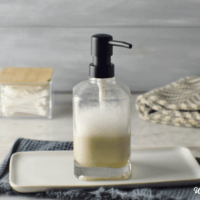I’ve made natural alternatives for body wash, dry shampoo, and other hair care products, but homemade shampoo was by far the toughest. After lots of (failed) experiments, I finally came up with a recipe for DIY moisturizing homemade shampoo. It uses natural ingredients and leaves my hair feeling soft and silky!
DIY Shampoo
I wanted to get away from store-bought shampoos that were full of unhealthy preservatives, synthetic chemicals, and artificial fragrances. Many commercial shampoos just aren’t that great for your hair and scalp.
I tried the “no-poo” method, which has great results for some, but did not work on me at all (and I have some terrible Christmas pictures to prove it!). If you have coarse hair that’s normal to dry, this method may be great for you! I have baby-fine more oily hair and it didn’t work for me.
If you’re not familiar with no-poo, it usually involves rubbing baking soda water onto the scalp as a shampoo alternative. Many people follow it up with an acv rinse (apple cider vinegar rinse) and maybe some coconut oil on hair ends as a conditioner. Some people find it works great, while others report an itchy scalp, hair loss, and gunky build-up in the hair follicles. Over time it can also strip the natural oils from hair.
Don’t Want to Make It?
When I’m traveling or don’t have time to make my own, I’ve used a few organic shampoos that worked really well. My faves are:
- Wellnesse Shampoo – I co-founded this company and helped formulate the recipes. It uses ingredients that are not only non-toxic but have proven health benefits. There’s even an option for curly hair!
- Morrocco Method Raw and Natural Organic Shampoo – this doesn’t lather like normal shampoo but it’s been amazing on my hair and has helped strengthen it over time.
A Different Homemade Shampoo
I missed the foaming aspect of shampoo (I know… the “foam” in regular shampoo is made from synthetic chemicals and detergents…).

My first time making homemade shampoo I tried plain liquid castile soap, which left me with frizzy hair and a mess of tangles. Then I tried a bunch of homemade recipes that didn’t work well at all. Finally, with the inspiration of a natural coconut milk (scented) shampoo that I love, I finally found a recipe I’m happy with and that doesn’t leave my hair tangled, oily, or both.
It works on kid’s hair too. That’s a picture of my daughter’s newly washed hair (though it isn’t tear-free, so watch the eyes!). It suds somewhat like conventional shampoo and you can customize it to your needs.
It’s such an easy natural shampoo recipe that I can’t believe it took me this long to think of it…
The secret ingredient: Coconut Milk!
What You’ll Need for Homemade Shampoo
- Coconut milk – The coconut milk helps soften and adds natural oils. (UPDATE: a couple of readers mentioned that the canned stuff did not work well for them, but homemade coconut milk worked great… Depending on your hair type, homemade may be better for you).
- Liquid castile Soap (like Dr. Bronners)
- Essential Oils of choice (I’ve used peppermint, lavender, rosemary, and orange or combinations of those). Or you can skip them for an unscented version.
- Carrier oil – If your hair is more dry you can add a hair nourishing oil. I usually use olive oil, but castor oil, avocado oil, or jojoba oil also work well. Castor oil also helps with hair growth.
Other homemade shampoos call for ingredients like raw honey, vitamin E, aloe vera gel, or glycerin. Feel free to experiment until you find what works for your hair! Another wonderful and cost-effective option is to make shampoo bars (like bar soap for your hair).
Essential Oils for Hair
Adding a few drops of essential oils adds more than just a nice scent. They can also improve scalp and hair health to help thicken hair, prevent breakage, and combat dandruff. Here are a few different options and what they do. I’ve written more extensively on essential oils for hair here.
- Tea tree oil – Useful for dandruff and itchy scalp. Also treats head lice!
- Rosemary – Reduces scalp itchiness and flakes, restores hair’s natural oil balance, and can help prevent split ends.
- Lavender – Studies show it increases the number of hair follicles for better hair growth.
- Peppermint – Increases hair growth, thickness, and length and deepens hair follicles for stronger hair.
Natural Homemade Shampoo
Equipment
- Silicone squeeze bottle (or reused shampoo bottle)
Materials
- ¼ cup coconut milk
- ¼ cup castile soap
- 20 drops essential oils (such as peppermint, lavender, rosemary, or orange)
- ½ tsp almond or olive oil (for dry hair, optional)
Instructions
- Combine all the ingredients in a bottle or jar. Pump soap dispensers and even foaming dispensers work well for this. If you use a foaming dispenser you may need to add ¼ cup of distilled water.
- Shake well to mix.
- Shake before each use and massage through the scalp.
- Store your shampoo in the fridge after each use.
Notes
- If you use a foaming dispenser, it also makes a great shaving cream.
- The shelf life of this shampoo is about one week when stored in the fridge.
Troubleshooting Tips
How well this shampoo works depends on your hair type and also your water. Some people with really hard water find it doesn’t combat the extra minerals in their water very well.
Which coconut milk you use can make a difference too. Some have noted that canned coconut milk did not work for them, but homemade did. Keep in mind that homemade coconut milk has a shorter shelf life than canned though.
If you find your hair is really greasy and unmanageable after using this, try doubling the castile soap so it’s 2 parts soap to 1 part coconut milk.
Natural Hair Conditioner
Now that you have a natural shampoo, what about conditioner? Since the coconut oil (and optional carrier oil) are already moisturizing you may not need to use any conditioner. Here are a few different options if you want to try them though!
- A chamomile tea rinse at the end of each shower (leave in hair!) will produce smooth, silky hair and naturally lighter hair over time.
- Some people find a 50:50 mixture of apple cider vinegar and water used as a rinse helps get hair cleaner and increases shine. You could also put it in a spray bottle for easier application.
- This homemade conditioner recipe features hair-nourishing oils, glycerin, and essential oils.
But… Don’t Wash Your Hair Every Day!
I can’t leave out one of my biggest healthy hair discoveries. Hair is happiest when you don’t wash it every day! Read this post to find out why the experts say how you wash your hair matters just as much as what you wash it with!
Ever made your own shampoo? Gone “no-poo?” How’d it go? Share below!






Leave a Reply